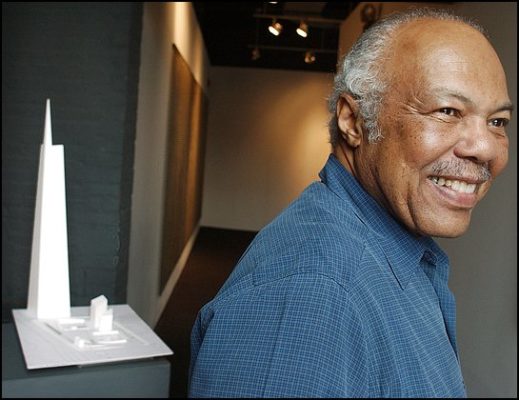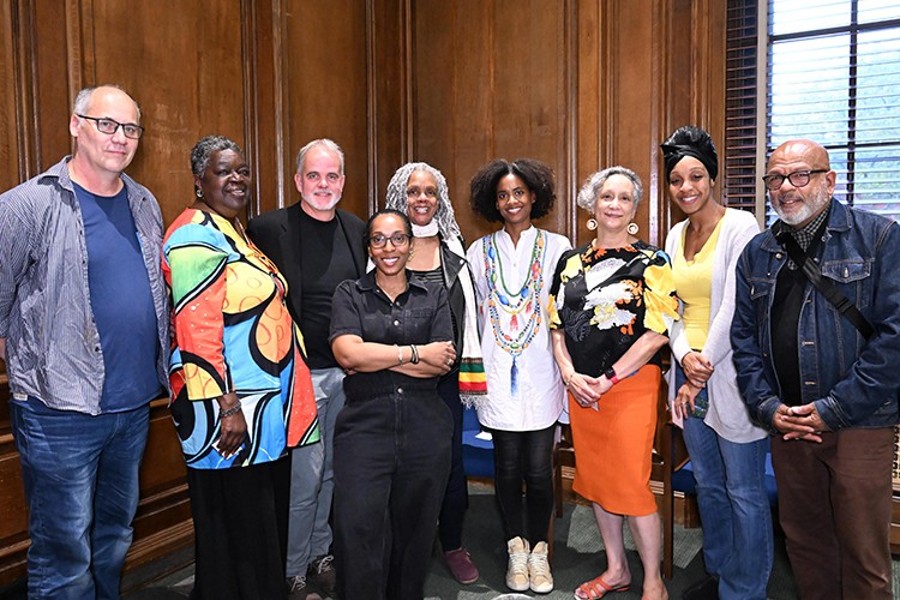 J. Max Bond Jr., Aka Max Bond, 1935 – February 18, 2009, was one of New York’s most influential architects.
J. Max Bond Jr., Aka Max Bond, 1935 – February 18, 2009, was one of New York’s most influential architects.
He developed an interest in architecture based on experiences ranging from viewing a staircase at a dormitory at the Tuskegee Institute to views of North African construction styles on a visit to Tunisia. Bond was educated at Harvard University, where he was awarded a bachelor’s degree in 1955 and earned a master’s degree three years later. During his time at Harvard, he was one of a group of eleven black students targeted by a cross-burning incident in front of their dormitory, Stoughton Hall. He ignored advice from a Harvard faculty member to give up the professional pursuit of architecture due to his race, overcoming barriers in what was at the time a white profession.
He started his professional career in France with André Wogenscky. He moved back to New York City, working at the firms of Gruzen & Partners and at Pedersen & Tilney. He moved to Ghana in the mid-1960, where he designed several government buildings, including the Bolgatanga Regional Library in an area near the border with Burkina Faso, which consisted of four buildings shaded by a common roof that was designed to provide natural ventilation and make air conditioning unnecessary.
Back in the United States, he served as head of the Architects’ Renewal Committee in Harlem (ARCH) in 1967 and 1968. In 1970, together with Donald P. Ryder, he founded the architectural firm of Bond Ryder & Associates which was responsible for the design of the Martin Luther King Jr. Center for Nonviolent Social Change in Atlanta, and the Birmingham Civil Rights Institute in Birmingham, Alabama, as well as Harlem’s Schomburg Center for Research in Black Culture.
Back in the United States, he served as head of the Architects’ Renewal Committee in Harlem (ARCH) in 1967 and 1968. In 1970, together with Donald P. Ryder, he founded the architectural firm of Bond Ryder & Associates which was responsible for the design of the Martin Luther King Jr. Center for Nonviolent Social Change in Atlanta, and the Birmingham Civil Rights Institute in Birmingham, Alabama, as well as Harlem’s Schomburg Center for Research in Black Culture.
The firm was merged with Davis Brody & Associates after Ryder’s retirement in 1990. Bond became a partner at the newly combined firm of Davis Brody Bond, bringing over nine architects to join the nearly 100 at Davis, Brody, which had been best known for its work at Manhattan residential developments at Riverbend Houses, Waterside Plaza and Zeckendorf Towers. Bond was responsible for the museum component at the National September 11 Memorial & Museum at the World Trade Center site at the time of his death.
Bond served as chairman of the architecture division at the Columbia University Graduate School of Architecture and Planning in Harlem, NY, from 1980 to 1984. He was dean from 1985 to 1992 at the City College of New York School of Architecture and Environmental Studies. He served as a member of the New York City Planning Commission from 1980 to 1986.
Death and family
A resident of Harlem, Bond died of cancer at age 73 on February 18, 2009. He was survived by Jean Carey Bond (his wife), two children, three grandchildren, a sister and a brother.
His father was J. Max Bond Sr., President of the University of Liberia. His mother was Ruth Clement Bond, and his brother was Prof. George C. Bond at Columbia University/Teachers College in Harlem, NY. His uncle was Horace Mann Bond, and his cousin was Julian Bond.
Become a Harlem Insider!
By submitting this form, you are consenting to receive marketing emails from: Harlem World Magazine, 2521 1/2 west 42nd street, Los Angeles, CA, 90008, https://www.harlemworldmagazine.com. You can revoke your consent to receive emails at any time by using the SafeUnsubscribe® link, found at the bottom of every email. Emails are serviced by Constant Contact








